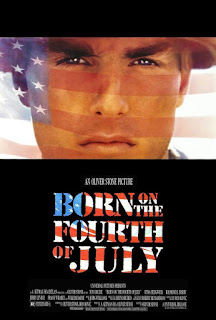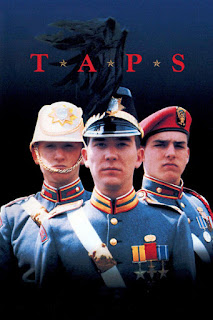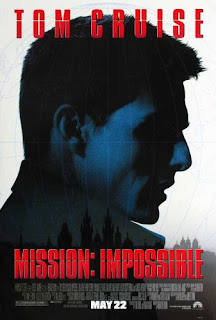Born on the Fourth of July (1989)
Eight years and ten movies after Cruise's first film Endless Love, Cruise finally accomplished a feat that seemed perhaps implausible after some of his more pronounced cinematic failures: he received an Oscar nomination for Best Actor. The film that earned him this nomination was Born on the Fourth of July, adapted from Ron Kovic's autobiography of the same name and directed by Oliver Stone, who had snagged the Oscar for Best Picture two years prior with another Vietnam War story, Platoon. While Platoon might have ultimately had a larger impact on film history than Born on the Fourth of July, the latter marks a large development in Cruise's career: not only was he a movie star, but he was a critically-acclaimed actor, as well.
Cruise wasn't the first choice to play Kovic, a disabled Vietnam War veteran turned anti-war activist, however. Ten years prior, William Friedkin was attached to direct the project with Al Pacino set to star. However, Friedkin dropped out, and so did Pacino after Stone inherited the project. Stone postponed the film, reportedly waiting until he was a bit more well-known in the industry. In 1986, Cruise approached Stone for a roll in Wall Street; while Charlie Sheen had already been cast in the role Cruise wanted, Stone suggested Born on the Fourth of July instead. Cruise accepted.
There were many apprehensions about the movie when production began. Executives worried about the film's anti-war message and Cruise as the starring role, as he hadn't ever starred in a dramatic role this heavy prior to that point. Ron Kovic was also unsure about Cruise playing him, as well. His mind changed when he met Cruise, as he felt their interaction demonstrated Cruise's genuine desire to portray him accurately and kindly. Similarly, the studios got their happy ending when Born on the Fourth of July ended up grossing 9 times its budget, receiving 6 Oscar nominations, and winning Best Director and Best Film Editing.
It's not surprising that it received the attention it did. Born on the Fourth of July follows a projection that's basically standard for anti-war Vietnam War films at this point: a white, all-American boy is inspired to fight for his country in Vietnam, becomes incredibly disillusioned while fighting, and returns home completely changed. While there's nothing wrong with this per sey (The Deer Hunter is one of my all-time favorite movies, for example), it does leave more to be desired from movies like this.
Perhaps my biggest qualm with Vietnam War films is the focus on the injustice done to Vietnam War veterans and labeling the war itself as "pointless" without diving deeper into the reason for the US' involvement and the horrendous damage done to the Vietnamese, who continue to grapple with the effects of Agent Orange and the general trauma of a war fought in their country by an invading force. There's a point earlier on in the film where a nurse at the hospital Kovic stays in mentions that the Vietnam War "is a white man's war," but this point is never expanded upon. It's a great point to make, one that's very often left unexplored in Vietnam War films (I always think about Apocalypse Now, which frustrates me greatly with its focus on the war being pointless instead of the war very much having a point but was never successful in its reasoning). The Vietnam War was, objectively, an imperialist, neo-colonist war. A fight for Vietnamese independence from the brutal rule of the French turned into unimaginable violence against the Vietnamese people by a much more powerful foreign military in the name of preserving Western influence in Southeast Asia. Regardless of whether or not you agree with communism, that is the reality of the Vietnam War, and it shouldn't be too much to expect of anti-war messages to take that stance.
But we never get that. Rather, we see brief images of dead Vietnamese peasants and hear discussion of the war crimes US soldiers committed in Vietnam, but the discussion never leads back to the injustice done to the Vietnamese but rather the cruelty of the US government for leaving traumatized soldiers to fend for themselves once they're back in the country. Regardless of personal feelings on the veterans themselves, the continued focus on the psychological consequences US soldiers dealt with because of the Vietnam War does a large disservice to Vietnam and all its people.
Those criticisms aside, though, Born on the Fourth of July is a fine movie. I don't find it as deeply moving as some other anti-war films such as The Deer Hunter, but that's more because films like the latter focus more on how relationships are affected instead of following a single person and his life. The editing is also a bit fun; shades of red, white, and blue were used as filters for scenes with different moods and meanings. And I really do enjoy the score for this film; the theme is one of my personal favorites of John William's entire career. But most noteworthy to me is Cruise's presence in this film and the broader implications it had in his life and career.
Continuing his method acting trend, Cruise stayed in a wheelchair for most of filming. Stone only further enabled these antics. As Andrew Morton writes in his biography on Cruise:
For the first time, Cruise's hard work finally paid off. It did, however, come as a blow to his marriage with Mimi Rogers, which was already strained for a few reasons, including their involvement with the Church of Scientology. The timing of Born on the Fourth of July ultimately couldn't have been more perfect, though: Cruise was now set up to go into a new decade as one of the hottest stars in Hollywood with proof that he could star in bigger films with more complex stories. While the days of Top Gun have never been completely gone, the 1990s are definitely the decade of Tom Cruise at his acting peak. If it weren't for Born on the Fourth of July demonstrating what Cruise is capable of doing, perhaps he would have faded away completely before the 90s ended (especially when taking his following two films into consideration).
For those interested in Cruise's career, this film is an absolute must-see in terms of placing this rest of his filmography into context. Otherwise, those interested in anti-war films or dramas with strong lead performances might also enjoy a movie like this. It doesn't offer much new in the grander scheme of movies like this one, but there's something to take away from it in the end.
Rating: 3.5/5 - March 5, 2020
Cruise wasn't the first choice to play Kovic, a disabled Vietnam War veteran turned anti-war activist, however. Ten years prior, William Friedkin was attached to direct the project with Al Pacino set to star. However, Friedkin dropped out, and so did Pacino after Stone inherited the project. Stone postponed the film, reportedly waiting until he was a bit more well-known in the industry. In 1986, Cruise approached Stone for a roll in Wall Street; while Charlie Sheen had already been cast in the role Cruise wanted, Stone suggested Born on the Fourth of July instead. Cruise accepted.
There were many apprehensions about the movie when production began. Executives worried about the film's anti-war message and Cruise as the starring role, as he hadn't ever starred in a dramatic role this heavy prior to that point. Ron Kovic was also unsure about Cruise playing him, as well. His mind changed when he met Cruise, as he felt their interaction demonstrated Cruise's genuine desire to portray him accurately and kindly. Similarly, the studios got their happy ending when Born on the Fourth of July ended up grossing 9 times its budget, receiving 6 Oscar nominations, and winning Best Director and Best Film Editing.
It's not surprising that it received the attention it did. Born on the Fourth of July follows a projection that's basically standard for anti-war Vietnam War films at this point: a white, all-American boy is inspired to fight for his country in Vietnam, becomes incredibly disillusioned while fighting, and returns home completely changed. While there's nothing wrong with this per sey (The Deer Hunter is one of my all-time favorite movies, for example), it does leave more to be desired from movies like this.
Perhaps my biggest qualm with Vietnam War films is the focus on the injustice done to Vietnam War veterans and labeling the war itself as "pointless" without diving deeper into the reason for the US' involvement and the horrendous damage done to the Vietnamese, who continue to grapple with the effects of Agent Orange and the general trauma of a war fought in their country by an invading force. There's a point earlier on in the film where a nurse at the hospital Kovic stays in mentions that the Vietnam War "is a white man's war," but this point is never expanded upon. It's a great point to make, one that's very often left unexplored in Vietnam War films (I always think about Apocalypse Now, which frustrates me greatly with its focus on the war being pointless instead of the war very much having a point but was never successful in its reasoning). The Vietnam War was, objectively, an imperialist, neo-colonist war. A fight for Vietnamese independence from the brutal rule of the French turned into unimaginable violence against the Vietnamese people by a much more powerful foreign military in the name of preserving Western influence in Southeast Asia. Regardless of whether or not you agree with communism, that is the reality of the Vietnam War, and it shouldn't be too much to expect of anti-war messages to take that stance.
But we never get that. Rather, we see brief images of dead Vietnamese peasants and hear discussion of the war crimes US soldiers committed in Vietnam, but the discussion never leads back to the injustice done to the Vietnamese but rather the cruelty of the US government for leaving traumatized soldiers to fend for themselves once they're back in the country. Regardless of personal feelings on the veterans themselves, the continued focus on the psychological consequences US soldiers dealt with because of the Vietnam War does a large disservice to Vietnam and all its people.
Those criticisms aside, though, Born on the Fourth of July is a fine movie. I don't find it as deeply moving as some other anti-war films such as The Deer Hunter, but that's more because films like the latter focus more on how relationships are affected instead of following a single person and his life. The editing is also a bit fun; shades of red, white, and blue were used as filters for scenes with different moods and meanings. And I really do enjoy the score for this film; the theme is one of my personal favorites of John William's entire career. But most noteworthy to me is Cruise's presence in this film and the broader implications it had in his life and career.
Continuing his method acting trend, Cruise stayed in a wheelchair for most of filming. Stone only further enabled these antics. As Andrew Morton writes in his biography on Cruise:
For the best part of a year, Tom put himself through mental and physical torture as he tried to convey the anger and agonies undergone by Kovic. Routinely described as intense and focused, for once Tom met his match in his director, who was utterly absorbed by the story. Twice Stone sent him to boot camp. “I didn’t want his foxhole dug by his cousin,” he said afterward. Stone was constantly encouraging his leading man to read more about Vietnam, to meet more veterans and visit more hospitals to truly understand the anguish and helplessness felt by these forgotten heroes.
At one point, in the madness that infects this kind of passionate, close-quarters project, Stone convinced Tom to allow himself to be injected with a chemical that would have rendered him paralyzed for two days so that he could more realistically convey the incontinent, impotent torture of a once-virile young man confined to a wheelchair. As there was a chance that he would have suffered permanent incapacitation, the insurance company wisely vetoed the madcap idea.
For the first time, Cruise's hard work finally paid off. It did, however, come as a blow to his marriage with Mimi Rogers, which was already strained for a few reasons, including their involvement with the Church of Scientology. The timing of Born on the Fourth of July ultimately couldn't have been more perfect, though: Cruise was now set up to go into a new decade as one of the hottest stars in Hollywood with proof that he could star in bigger films with more complex stories. While the days of Top Gun have never been completely gone, the 1990s are definitely the decade of Tom Cruise at his acting peak. If it weren't for Born on the Fourth of July demonstrating what Cruise is capable of doing, perhaps he would have faded away completely before the 90s ended (especially when taking his following two films into consideration).
For those interested in Cruise's career, this film is an absolute must-see in terms of placing this rest of his filmography into context. Otherwise, those interested in anti-war films or dramas with strong lead performances might also enjoy a movie like this. It doesn't offer much new in the grander scheme of movies like this one, but there's something to take away from it in the end.
Rating: 3.5/5 - March 5, 2020





Comments
Post a Comment